
Environment
|
5th US-India Energy Summit charts out roadmap for enhanced strategic partnershipBy Deepak Arora WASHINGTON DC, Oct 1: Dr Ernest Moniz, United States Secretary of Energy, said "the enhanced strategic partnership" announced by President Barack Obama and Prime Minister Narendra Modi marks a major development in the collaboration between the two countries in energy and sustainable development. Speaking at the 5th US-India Energy Partnership Summit, Dr Moniz said, "Our partnership is robust, reliable, enduring and expanding." He added, "We can together build a clean sustainable future that President Obama and Prime Minister Modi are committed to." Dr R K Pachauri, President, TERI North America and Director General, TERI, said: "For the first time there is optimism and an upbeat attitude towards renewable energy in India." He spoke of prospects of a breakthrough. He said that the Summit discussions had developed several ideas to help implement the goals of the "new and enhanced strategic partnership on energy security, clean energy, and climate change" announced by the leaders of the US and India. Dr Moniz said Mr Modi "is providing a new momentum". In the area of finding low-carbon energy solutions for India's ambitious plans, Dr Moniz said nuclear energy is an area where we need to step up collaboration. He pointed out four areas "we have a strong base to build on":
The two-day Summit, organized The Energy and Resources Institute (TERI) North America and Yale University, brought experts from the fields of energy, finance, policy, technology, climate change and environment, and deliberated on collaborations between the US and India. USAID Administrator Dr Rajiv Shah spoke of Mr Modi's meeting with Mr Obama and their commitment to working jointly. "This cooperation represents a new opportunity for business, partnerships and investment for both the US and for India." He referred to the progress on projects in India and said: "We want to nurture innovations and share innovations in India and across the world." Confluence of ideas Ms Leocadia Zak, Director, US Trade and Development Agency (USTDA), emphasized the role of the private sector. "To be able to accomplish our goals, it's not just about governments, it's about the private sector, it's about the people," she said. USTDA brings US private sector, US business and links it with emerging economies. What we are doing can have mutual benefit. She said an area for significant focus is the technology grid. She cited a program involving the setting up of a roadmap for Tata Energy to reduce electric grid transmission losses which has and seen tremendous results. Mr Sidharth Birla, President, FICCI, raised the issue of reconciling the alleviation of poverty with environmental needs. He said efficiencies should be scaled up for this and the cooperation of the government and the private sector was essential. A recurring theme at the Summit was finding simper ways to create a suitable climate for investment and private sector participation. Mr Bruce Andrews, United States Deputy Secretary of Commerce, said an important challenge was how to make it easier for US companies that wish to be a part of the Indian market. "Infrastructure collaboration plan is something they are very excited about, and for this to be successful we need to look at the business climate." He added, "We're excited and encouraged by Prime Minister Modi's goal. American companies are very excited about the Indian market." Mr Jonathan Elkind, Assistant Secretary for International Affairs (Acting), US Department of Energy, said in times to come cities will become more hungry for energy and more difficult to manage. "How can one simply germinate good practices in isolated countries as well as provide good opportunities for investors to create favourable returns?" Dr Peter Salovey, President, Yale University, spoke of the role of universities in enhancing cooperation between India and the US through training future leaders in technology and policy. In the area of carrying out research and providing intellectual leadership, he said Yale was involving the disciplines of architecture, environment and forestry to develop integrated solutions. UTC & TERI partnership In the first concrete action since the US and Indian leaders announced plans to boost cooperation in energy fields, TERI and United Technologies Corp. signed a Memorandum of Understanding to set up the Center of Excellence on Energy Efficient Buildings in India's Cities. The United Technologies -TERI Center of Excellence will be set-up at and administered by TERI and will focus on ways to evaluate and enhance energy efficiency in existing buildings in India. This initiative was made possible by a donation from United Technologies. Dr. J. Michael McQuade, UTC Senior Vice President of Science and Technology, said, "With India's expected urban expansion over the next 20 years, it is imperative that we make India's existing and future buildings more energy efficient. UTC's contribution to create this new Center of Excellence is a major step forward in supporting that mission." Among the highlights of the Summit was a preliminary agreement signed between TERI and UBrainTV to provide a green online TV for Indian audiences on sustainable development and education. Dr Pachauri and Mr Katsuya Kodma, chairman of Ubrain TV, inked the document. All activities at TERI move from formulating local and national-level strategies to suggesting global solutions tackling critical energy and environment related issues. Headed by Dr. R.K. Pachauri, also the chairperson of the Nobel Peace Prize winning climate change body, IPCC, TERI has emerged as an institution of excellence for its path-breaking research, and is a global brand widely respected by political leaders, policy makers, corporate entities as well as the civil society at large. IPCC presents its Fifth Assessment ReportBy Deepak Arora
Speaking on the occasion, Dr R K Pachauri, Director General, TERI and Chairman, IPCC said: “The IPCC has completed three Working Group reports as part of the Fifth Assessment cycle. These contain a substantial amount of information and important findings on the underlying physical science basis of climate change, its impacts, adaptation possibilities and the vulnerability of different parts of the globe, as well as mitigation options. India is vulnerable to several impacts of climate change, and as a signatory to global agreements on climate change, also has a responsibility to take appropriate action. Dealing with climate change would require a substantial expansion of awareness on all aspects of climate change, and these may be relevant for decision making in India. The outreach event is a step towards creating awareness on the findings of the parts of the IPCC Fifth Assessment Report brought out thus far.” Changes of sea level in the Indian Ocean have emerged since the 1960s, driven by changing wind patterns. Today already, climate-related risks threaten lives, food security, health and wellbeing across many parts of South Asia. There are clear signs that climate change is already happening. The Asia region as a whole experienced the most weather and climate-related disasters in the world between 2000 and 2008 and suffered the second highest proportion (almost 30%) of total global economic losses. The risk of deaths due to flooding is highly concentrated in Asia. At the same time, as sea levels are rising, most Asian deltas are sinking as a result of groundwater extraction, floodplain engineering and trapping of sediments by dams. Severe floods in Mumbai in 2005 have been attributed to both climatic and non-climatic factors, suggesting an interaction between climate change and other stressors. BASIC ministerial meet on August 7, 8NEW DELHI, Aug 6: The two –day 18th BASIC countries (Brazil, South Africa, India and China) Ministerial Meeting will get underway on Thursday to discuss important issues relating to the current UNFCCC Climate Change negotiations specially on matters pertaining to the Adhoc Working Group on the Durban Platform. An official statement said Prakash Javadekar, Minister for Environment, Forest and Climate Change, Mr. Zhenhua, Vice Chairman, Minister National Development and Reform Commission, China, Ms. Teixeira, Minister of Environment, Brazil and Ms. Molewa, Minister of Environmental Affairs, South Africa will take part in the Ministerial meeting on August 8. The 17th BASIC Ministerial Meeting on Climate Change was held in Hanzghou, China last October. The statement said the BASIC Ministerial meeting provides an opportunity to Environment Ministers to enhance coordination on important issues in climate change negotiations and to arrive at a common position on such issues. The BASIC Ministers have been meeting regularly since the Conference of Parties in Copenhagen. US-India Energy ties set for new heights at TERI-Yale SummitBy Deepak Arora WASHINGTON DC, Aug 5: The recent visit of US Secretary of State John Kerry and Secretary of Commerce Penny Pritzker to India could not have come at a more crucial juncture. Their meetings with various dignitaries, including Indian Prime Minister Narendra Modi, reinforced the need to strengthen the relationship between the two countries, in the wake of India walking out of the WTO. In this context, the Fifth US-India Energy Partnership Summit, scheduled to take place from September 30 to October 1 in Washington DC, and organized by The Energy and Resources Institute North America (TERI NA) and Yale University, would be a significant platform for US-India ties on various fronts. At an event held in the run up to the Summit on July 30 in New Delhi, Mr Daniel Poneman, US Deputy Secretary of Energy, said: “The US and India are playing important roles globally in terms of energy security and climate change. This is an opportunity, as well as our responsibility, to preserve our precious planet. I believe US-India bilateral relations are poised to create huge opportunities in this sector. The time has come to move from analysis and take effective action in this regard.” Dr R K Pachauri, President, TERI NA and Chairman of the Intergovernmental Panel on Climate Change (IPCC), said: “Energy security is critical for both the US and India. The recent geopolitical developments in the region from where we import the bulk of our oil, can lead to a drastic increase in oil prices. The devaluation of the Rupee has added to the crisis. But I am confident that we are on the cusp of change in the use of our renewable energy resources. We should be investing more on renewable energy sources in the coming years. India and the US must work together, both in energy security as well as on policy fronts, so that we can bring in some positive changes.” The focus of the Summit will be on bilateral cooperation in the energy sector and related areas. To reinforce this cooperation, top business bodies including the American Chamber of Commerce in India (AMCHAM), the US-India Business Council (USIBC), and the Federation of Indian Chambers of Commerce and Industry (FICCI) have partnered to take this process forward. The partners at the Pre-Summit Roundtable included UTC, Applied Materials and Azure Power. Dr Annapurna Vancheswaran, Vice-President, TERI NA, said: “The Summit comes in the wake of Prime Minister Narendra Modi’s visit to the US, and the UN Secretary General's Climate Summit. A new climate is gaining momentum to strengthen the growth and development of US-India partnerships.” During the Roundtable, participants set the stage for the Summit and deliberated on new avenues to strengthen energy cooperation between the two countries, especially in the areas of renewable energy, energy access, green buildings and conventional fuels. Hosted annually since 2009 by TERI North America and Yale University, the Fifth US-India Energy Partnership Summit will broadly look at 'Accelerating Resilient Growth and Development', while addressing various issues related to energy efficiency, security, access and technology. Stakeholders from various sectors will discuss new collaborations in clean technologies and renewable energy, green buildings and sustainable cities, decentralized energy access, alternatives such as shale gas, etc. Climate change will also form a key component of the discussions, with the proceedings at the General Assembly and Climate Summit providing significant inputs to the Summit deliberations. TERI, USGBC form strategic allianceBy Deepak Arora Pix By Noyanika Arora
The Energy and Resources Institute (TERI) and the U.S. Green Building Council (USGBC) today announced a strategic collaboration to accelerate the development of high performance buildings in India and Southeast Asia. TERI’s GRIHA (Green Rating for Integrated Habitat Assessment) and USGBC’s LEED (Leadership in Energy and Environmental Design) have partnered to promote the best of global and Indian practices to ensure efficiency of design, construction and operation of high performance buildings. GRIHA has created locally relevant and technologically advanced mechanisms, which is crucial in regionalizing LEED in India and Southeast Asia. "Designing and constructing “green” buildings would ensure that India, and the world, do not get locked into a pattern of resource use intensity that would be unsustainable for a variety of reasons. TERI and USGBC share common goals in promoting green buildings round the world.”
This partnership between USGBC and TERI promises to take green buildings to the next level in India and across Southeast Asia,” said Rick Fedrizzi, President, CEO & Founding Chair, U.S. Green Building Council. “India is already the third largest market for LEED outside the U.S., and USGBC is committed to bringing our resources to advance more rapid adoption of green building practices.” The partnership will focus on two key initiatives: Existing buildings: The GRIHA Council implementing and supporting the LEED for Existing Buildings rating system and the LEED Dynamic Plaque for Indian and Southeast Asian markets. New buildings: Offering seamless pathways for dual ratings for new buildings: GRIHA projects will have the opportunity to earn LEED certification and LEED buildings will have the opportunity to earn GRIHA certification. Additionally, in an effort to continue strengthening the global consistency and review quality of the LEED rating system, the Green Building Certification Institute (GBCI) now manages certification of projects to all LEED rating systems in India. The LEED hub, USGBC’s renewed commitment to India, along with the strategic partnership with TERI, will add significant capacity in the market, encouraging even greater adoption of green standards across more populations in the region. TERI is a leading Indian non-government organisation (NGO), a global think tank conducting research and analysis in the genres of energy, environment and sustainable development. TERI conceived GRIHA (Green Rating for Integrated Habitat Assessment), the national rating system for green buildings in India. It is a green building design evaluation system and is suitable for all kinds of buildings in different climatic zones of the country. |
||||
Aviation
| Business | Defence
| Foreign Affairs | Communication
| Health | India |
United Nations
India-US | India-France
| Entertainment | Sports
| Photo Gallery | Tourism
| Advertise with Us | Contact
Us
© Noyanika International, 2007. All rights reserved.
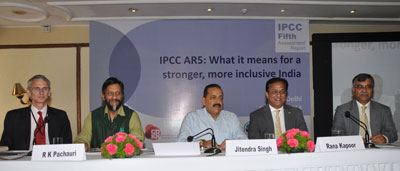 NEW DELHI, Aug 6: The Intergovernmental Panel on Climate Change (IPCC) presented the findings of the Fifth Assessment Report (AR5) to governments, civil society, the scientific community, media and other stakeholders at an outreach event held here on Wednesday. Titled ‘IPCC AR5 – What it means for a stronger, more inclusive India’, the event focused on the implications of the AR5 findings for India and for countries in South Asia, with a view to communicate the report’s findings effectively to India’s public and decision-makers, as well as to increase the accessibility of the report and promote discussion and connections between diverse stakeholders.
NEW DELHI, Aug 6: The Intergovernmental Panel on Climate Change (IPCC) presented the findings of the Fifth Assessment Report (AR5) to governments, civil society, the scientific community, media and other stakeholders at an outreach event held here on Wednesday. Titled ‘IPCC AR5 – What it means for a stronger, more inclusive India’, the event focused on the implications of the AR5 findings for India and for countries in South Asia, with a view to communicate the report’s findings effectively to India’s public and decision-makers, as well as to increase the accessibility of the report and promote discussion and connections between diverse stakeholders.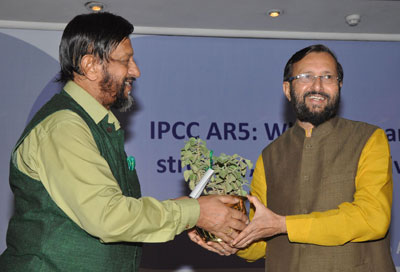 “Our Indian ethos has always been in tune with Nature. But science is dynamic and one must believe in it. While GM crops are important, proper precautions need to be taken. Though growth as priority might lead to increased emissions, India is still is committed to sustained green growth,” Javadekar added.
“Our Indian ethos has always been in tune with Nature. But science is dynamic and one must believe in it. While GM crops are important, proper precautions need to be taken. Though growth as priority might lead to increased emissions, India is still is committed to sustained green growth,” Javadekar added.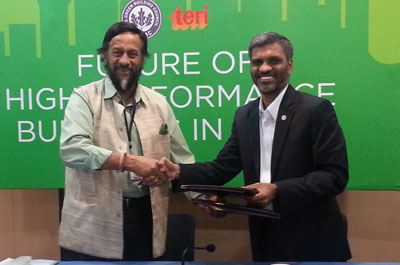 NEW DELHI, July 7:
NEW DELHI, July 7: 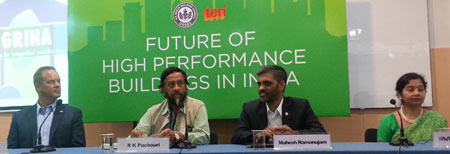 Speak-ing at the event, Dr. R.K. Pach-auri, Direc-tor-General, TERI, said: “Several studies have estimated that most of the buildings projected to be standing in 2030 in India have yet to be built. The demand for energy, water and other inputs for these buildings and those that already exist will be staggering.
Speak-ing at the event, Dr. R.K. Pach-auri, Direc-tor-General, TERI, said: “Several studies have estimated that most of the buildings projected to be standing in 2030 in India have yet to be built. The demand for energy, water and other inputs for these buildings and those that already exist will be staggering. 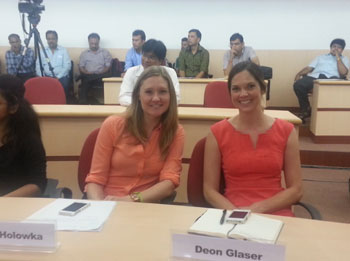
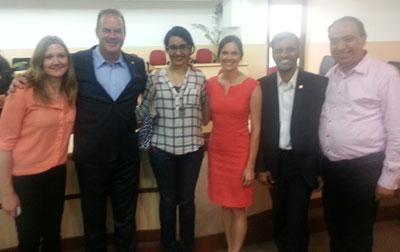 The partnership comes on the heels of last month’s announcement from USGBC regarding its expansion of support for LEED in India.
The partnership comes on the heels of last month’s announcement from USGBC regarding its expansion of support for LEED in India.